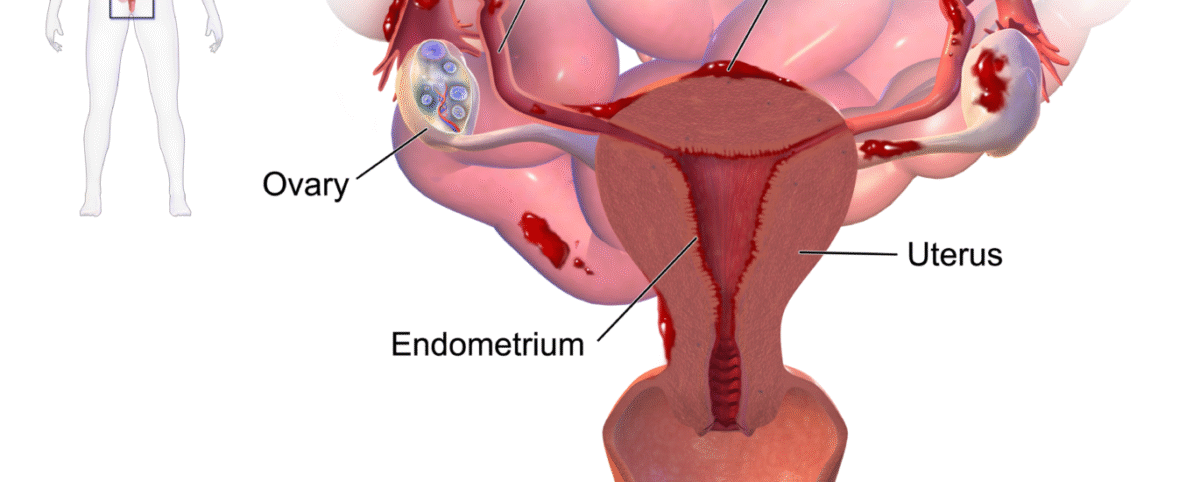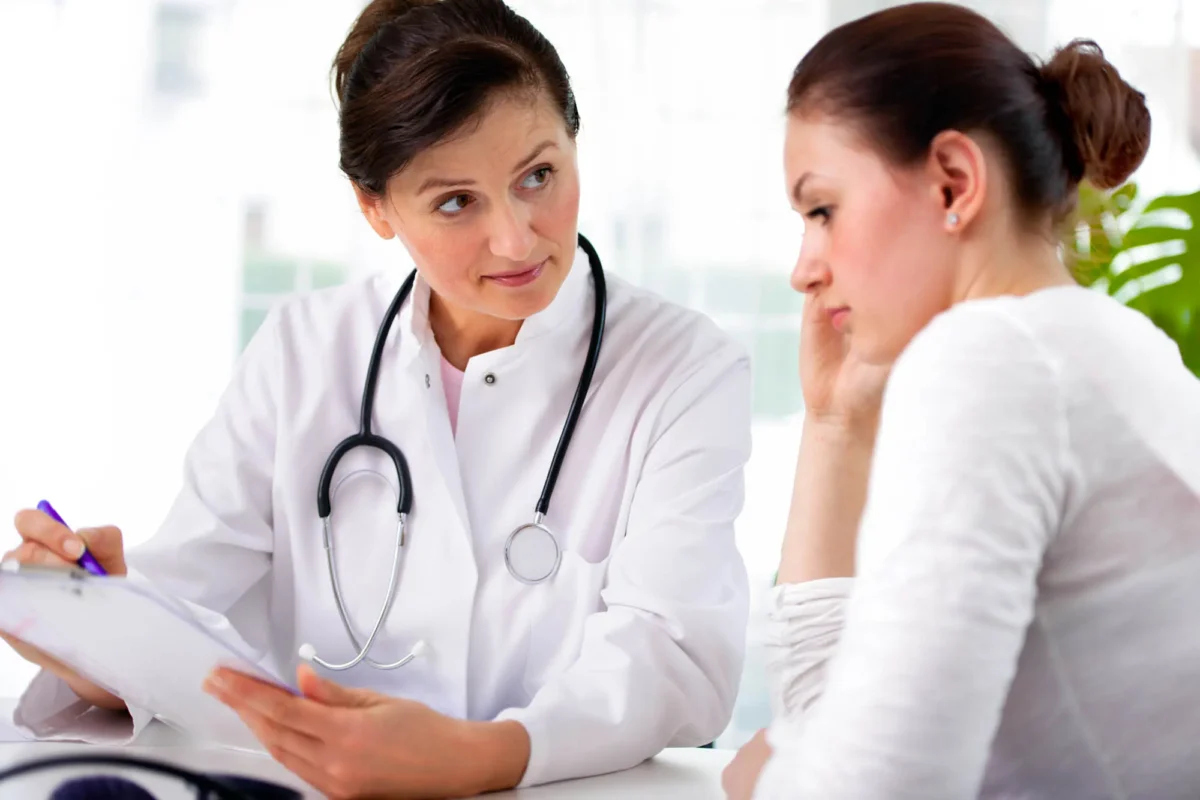Endometriosis Consultation at Gynae Anjana Clinic
Comprehensive Care for Endometriosis – Get Expert Consultation Today
Are you experiencing severe menstrual cramps, chronic pelvic pain, or difficulty conceiving? You might be suffering from endometriosis, a common yet often misunderstood gynecological condition. At Gynae Anjana Clinic, we specialize in diagnosing and treating endometriosis with personalized, non-surgical, and surgical solutions to help you lead a pain-free and healthy life.

What is Endometriosis?
Endometriosis is a condition where tissue similar to the lining of the uterus (endometrium) grows outside the uterus, leading to inflammation, scarring, and pain. These abnormal tissue growths commonly affect the ovaries, fallopian tubes, and pelvic lining, but in severe cases, they can spread beyond the pelvic region. For detail study look at: Mayo Clinic: Endometriosis
Symptoms of Endometriosis

Endometriosis symptoms vary from mild to severe and may include:
- Severe menstrual cramps (dysmenorrhea)
- Chronic pelvic pain
- Pain during intercourse (dyspareunia)
- Heavy or irregular menstrual bleeding
- Painful urination or bowel movements (especially during periods)
- Fatigue, bloating, or nausea during periods
- Difficulty conceiving (infertility)
Note: The severity of pain does not always indicate the extent of the disease. Some women with mild endometriosis experience intense pain, while others with advanced endometriosis may have minimal symptoms.
Causes & Risk Factors of Endometriosis
The exact cause of endometriosis is unknown, but several theories exist, including:
- Retrograde Menstruation: Menstrual blood flows backward into the pelvic cavity instead of exiting the body.
- Hormonal Imbalances: Estrogen plays a key role in endometrial tissue growth.
- Genetics: A family history of endometriosis increases the risk.
- Immune System Disorders: The immune system may fail to recognize and destroy abnormal endometrial tissue outside the uterus.
- Surgical Scars: C-sections or hysterectomy scars may allow endometrial cells to implant outside the uterus.
Who is at Risk?

Women with the following conditions may have a higher risk of developing endometriosis:
- Family history of endometriosis
- Early onset of menstruation (before age 11)
- Short menstrual cycles (less than 27 days)
- Heavy or prolonged periods
- Delayed pregnancy or never giving birth
How is Endometriosis Diagnosed?
At Gynae Anjana Clinic, we use advanced diagnostic tools to accurately diagnose endometriosis and rule out other conditions. The process may include:
- Detailed Medical History & Symptom Assessment
- Pelvic Examination to check for cysts or abnormal growths
- Ultrasound (Transvaginal or Abdominal) for imaging the reproductive organs
- MRI Scan for detailed soft tissue imaging
- Laparoscopy (Minimally Invasive Surgery) to confirm and assess the severity of endometriosis
Treatment Options for Endometriosis
The treatment for endometriosis depends on the severity of symptoms, age, fertility goals, and overall health.
1. Medications for Pain & Hormonal Balance
- Pain Relievers: NSAIDs like ibuprofen to relieve cramps and inflammation.
- Hormonal Therapy:
- Birth control pills to regulate periods and reduce endometrial tissue growth.
- Progestin therapy (injections, IUDs) to suppress ovulation and slow endometriosis progression.
- Gonadotropin-releasing hormone (GnRH) agonists to induce temporary menopause and shrink endometrial tissue.
2. Surgical Treatment for Severe Cases
- Laparoscopic Surgery: Minimally invasive procedure to remove endometrial tissue while preserving fertility.
- Hysterectomy (Uterus Removal): Considered only in extreme cases when other treatments fail and fertility is not a concern.
3. Lifestyle & Alternative Treatments
- Dietary Modifications: Anti-inflammatory foods, reducing processed foods and dairy.
- Physical Therapy & Exercise: Yoga and stretching can ease pelvic pain.
- Stress Management: Meditation and deep breathing techniques to manage symptoms.
Early diagnosis and timely treatment are crucial to preventing complications like infertility and chronic pain.
Endometriosis & Infertility – Can You Still Conceive?
Endometriosis can cause scar tissue and adhesions that block the fallopian tubes, making conception difficult. However, many women with endometriosis can still get pregnant with the right medical intervention, including:
- Ovulation Induction & Medications
- Laparoscopic Surgery to Remove Lesions
- Intrauterine Insemination (IUI) & Assisted Reproductive Techniques
If you are trying to conceive with endometriosis, consult Dr. Anjana for a personalized fertility plan.
Why Choose Gynae Anjana Clinic for Endometriosis Consultation?
- 25+ Years of Experience in diagnosing & treating endometriosis.
- Advanced Diagnostic Techniques for precise evaluation.
- Personalized Treatment Plans based on your symptoms & fertility goals.
- Holistic & Minimally Invasive Approach for pain relief & improved quality of life.
- Compassionate & Confidential Care for all gynecological concerns.
FAQs on Endometriosis
❓ Can endometriosis be cured?
There is no permanent cure, but symptoms can be managed effectively with treatment.
❓ Does endometriosis always cause infertility?
No, but it can make conception difficult. Proper treatment improves fertility outcomes.
❓ At what age does endometriosis usually start?
It commonly starts in the teenage years or early adulthood and worsens over time if untreated.
❓ Can lifestyle changes help manage endometriosis?
Yes, a healthy diet, regular exercise, and stress management can reduce symptom severity.
For more details, visit Endometriosis Foundation of America.
Don’t let endometriosis pain control your life! Get the right diagnosis & treatment at Gynae Anjana Clinic today.
📅 Contact – Dr. Anjana Jain | GynaeAnjana
📞 Call: +91-9453951849
📍 Location: 332/11, Amarpuri Colony, Indira Nagar, Lucknow, Uttar Pradesh, India





